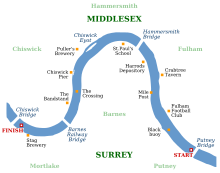The Boat Race 1914
In this year's race, umpired by former rower Frederick I. Pitman, Cambridge won by 4+1⁄2 lengths in a time of 20 minutes 23 seconds.
"[10] Conversely, he noted that Oxford suffered "from a dearth of material" which, followed by constant changes in the crew order, resulted in a "merely eight good men in a boat — and nothing more".
[12] Swann and Ewart Horsfall had both won gold medals in the men's eight at the 1912 Summer Olympics, rowing for Leander Club.
[13] Cambridge won the toss and elected to start from the Surrey station, handing the Middlesex side of the river to Oxford.
[11] According to Drinkwater, they took "things easy in the rough water" towards Barnes Bridge and went on to pass the finishing post four and a half lengths ahead,[11] in a time of 20 minutes 23 seconds.
[5] During the conflict, at least 42 Blues were killed,[16] including five of the 1914 participants: Dennis Ivor Day, cox L. E. Ridley, John Andrew Ritson and Gordon Garnett of the Cambridge crew, and Reginald William Fletcher from the Oxford boat.

